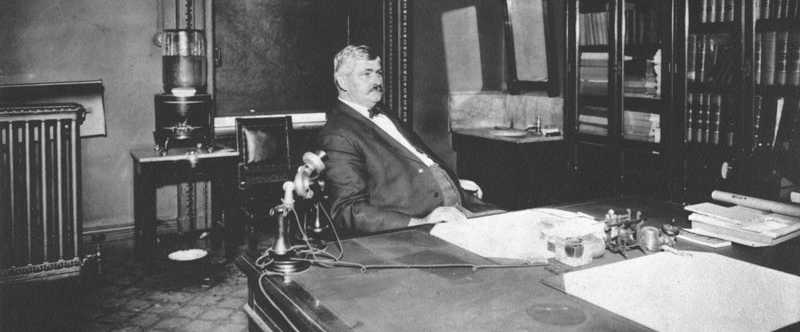Politics and his friendship with President Taft played a major role in Edward becoming the U.S. Marshal for the Eastern District of Missouri.
In 1909, Edward decided he would like to serve as U.S. Marshal of the Eastern District of Missouri. With his friend William Howard Taft now President, Edward had no trouble securing the job. He was sworn in June 21, 1910.
REGENHARDT TAKES OFFICE
U.S. MARSHAL IS SWORN IN AND SHOWERD WITH FELICITATIONS.
JUDGE DYER PRAISES MORSEY
Four Subordinates Reappointed – Tallest Officer in Federal Courts Wants Lower Ceilings
Edward F. Regenhardt was sworn into office as United States Marshall for the Eastern District of Missouri yesterday morning by Clerk W. W. Nall of the United States District Court. At the same time the retiring marshal, Col. W. L. Morsey, rendered his final accounting with the court, which opportunity United States District Court Judge David P. Dyer seized to deliver from the bench a eulogy upon Col Morsey and his retiring deputy Louis Wild. The accounts were approved and ordered filed by the court. In part, Judge Dyer said:
The presentation of the accounts of Mr. Morsey as marshal terminated his official connection with the court. In parting company officially with Mr. Morsey it may not be out of place for the court to that no public official has quitted the service with greater honor than does Mr. Morsey. The court feels authorized to any that his official action and courteous demeanor gained for him the confidence and respect of every judge that has presided in this or the Circuit Court of Appeals for this district. He carried with him in his retirement the best wishes, not only of the judges, but the members of the bar as well.
I have known him all of his life – we were raised in the same neighborhood, and it was my privilege to know his father, who was a distinguished lawyer in Warrenton. Mr. Morsey retires with a record untarnished and with the respect of every law-abiding citizen with whom in these many years he has come in contact.
His successor, whom I hope and believe will be a worthy successor to the retiring marshal, will now take the oath of office. The best wish I can make for Mr. Regenhardt is that when his term of office expires he can point with as much pride to the conduct of his office as Mr. Morsey does to his.
Col. Morsey Tenders Thanks
Col. Morsey in response thanked the court, his official associates and subordinates, the legal profession and the press for their courtesy throughout his twelve years of office. He showed emotion which affected all who heard his simple speech of thanks.
Marshall Regenhardt announced that Louis Wild, who voluntarily retired to return to his home in Warrenton, Mo. Would be succeeded by Edward E. Whitworth of Poplar Bluff, Mo. as office deputy, as announced in the Globe-Democrat about two weeks ago. Whitworth was formerly a deputy sheriff of Butler County and for eight years a police officer in Poplar Bluff. The marshal announced the following reappointments: Edmund J. Watson, chief office deputy, Oscar A. Knehans, bookkeeper, John J. Williams, office deputy, and Joseph P. O’Hearn, resident deputy at Hannibal.
The new marshal was recipient of many felicitations at his office. On his desk stood a giant bunch of flowers from his cousin, Robert H. Mueller, of the Hamilton-Brown Shoe Company; The Democrats of Cape Girardeau, MO., A. V. Vasterling, president pro-tem of the Cape Girardeau City Council, J.C. Cairns and J. T. Sackman, presented their fellow townsman with a solid gold star, emblematic of his office.
Mr. Regenhardt is known among his friends as “Big Ed” Regenhardt because of his size. He is the largest United States marshal in the country, measuring 6 feet 5 ¾ inches and weighing 290 pounds. He was formally a building contractor at Cape Girardeau. Yesterday he said he would recommend a number of radical changes in the office arrangements at the Federal Building. He has been given permission to fix up a private apartment for the United States commissioner and a private office for himself. He said: “These high ceilings are unsanitary. I am going to prevent bad air from circulating toward the top. I want this office just as hygienic as possible.
St. Louis Globe-Democrat
August 2, 1910, page 3, col. 4
Located: 9 Dec 1983
St. Louis Central Library
From the Southeast Missourian, October 4, 1929, page 3:
"Big Ed” Regenhardt, as he was popularly know to thousands, being six feet seven inches tall, and weighing 312 pounds when in “fighting trim,” was probably the only man who ever addressed the president of the United States by his first name and then slapped him on the knee to impress it.
When Regenhardt was United States marshal he took one of the publishers of The Missourian with him to Washington on an official errand. While there the two called on President Taft. A large number of people were waiting in the outer office to see the president and suddenly the president passed through a hall that gave him a view of the crowd.
He spied Regenhardt and turning suddenly he stepped into the room and took him by the hand, leading him and the others of the party into his office. While sitting there at the big desk, President Taft was recounting a political experience and with a thunderous chuckle slapped Ed. on the knee. Evidently wishing to be as complimentary as the chief executive, Ed. Addressed him as “Bill” and gave him a whack on the knee that made a noise like blasting rock.
After a while Secretary Chas. Nagle of the Interior Department, reminded the president that the Cabinet was waiting for the regular weekly meeting, and President Taft then invited Regenhardt and the others to step into the Cabinet room and see his official family. Every member of that body was standing by his chair when the president stepped in and after a round of introductions President Taft invited Regenhardt to call often.
The next day, while Regenhardt and his part were walking down a side street in Washington, a loud voice was heard calling “Ed.” It was President Taft out for a morning walk with his aide, Percy Butt. A street visit followed. It was another case of “Bill” and “Ed.”
Edward initially decided to rent an apartment in St. Louis, leaving his family in Cape Girardeau. He rented an apartment near Shaw's Garden at 4132 Cleveland Avenue. He shared the apartment with his brother-in-law, Fred Theuerkauf.
By February 1911, Edward no longer wanted to be in St. Louis without his family. Through a friend, he rented a farm home at 2449 Hord Avenue in Jennings, Missouri, a town about 6 miles northwest of downtown St. Louis.
I have one case, C.A. Tilles vs. E.F. Regenhardt that went to the Supreme Court in Oct 1911, but was dismissed. I have not found anything on the internet as to what this was about. It was appealed on a ruling from the 8th Court of Appeals in St. Louis.
The only other case I found was documented in "The Music Trade Review." It involved the bankruptcy of the Bollman Brothers Piano store.
-
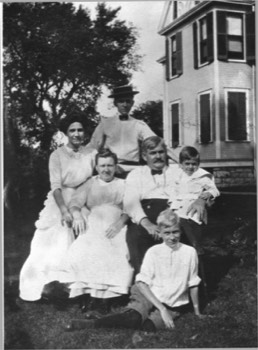
In back: William McKinley. Middle row: Norma, Alvina, Edward, Tiny. In front: Theodore Roosevelt
-
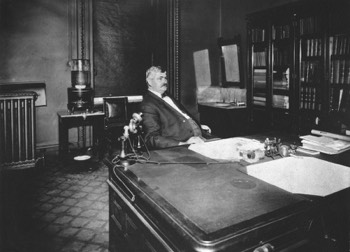
Ed Regenhardt, U.S. Marshal in office
-
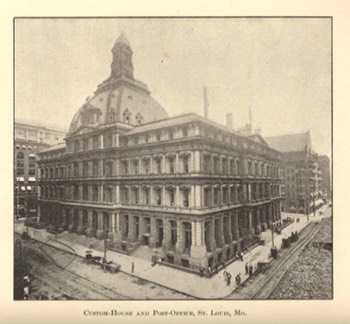
Post Office and Custom House - downtown St. Louis
-
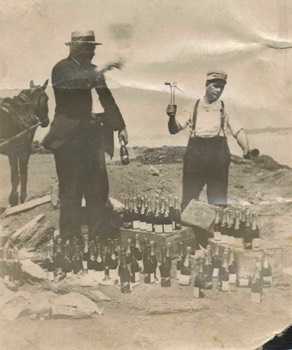
Ed Regenhardt (left) destroying bottles of champaign
Photo 1:
Taken about 1912 in front of rental farm home at 2449 Hord Avenue in Jennings, Missouri, a town about 6 miles northwest of downtown St. Louis.
In back: William McKinley. Middle row: Norma, Alvina, Edward, Tiny. In front: Theodore Roosevelt
Photo 2:
Ed's office was in downtown St. Louis, in the Customs House and Post Office Building, 8th and Olive
Photo 3:
Building where Ed Regenhardt's office was located. This building is still in use in downtown St. Louis.
Photo 4:
I'm not sure if this was a U.S. Marshal's responsibility....destroying what looks to be bottles of champaign. His associate is using a hatchet. I like Edward's approach - throwing them.
Most of his work was to make sure that persons appeared in federal court.
In 1913, his oldest son, William is working as a bailiff for the 8th Circuit Court of Appeals. He would be 19 years old.
Edward's term ended June 1914. Taft was not re-elected, and the new Democratic President Wilson appointed a fellow Demomcrat, John Lynch of Moberly, Missouri to be the next Marshal.
Ed moved his family back to Cape Girardeau, moving into a rental house. (He never owned a home in his lifetime.) He resumed his contracting business...dabbling in politics part time.
